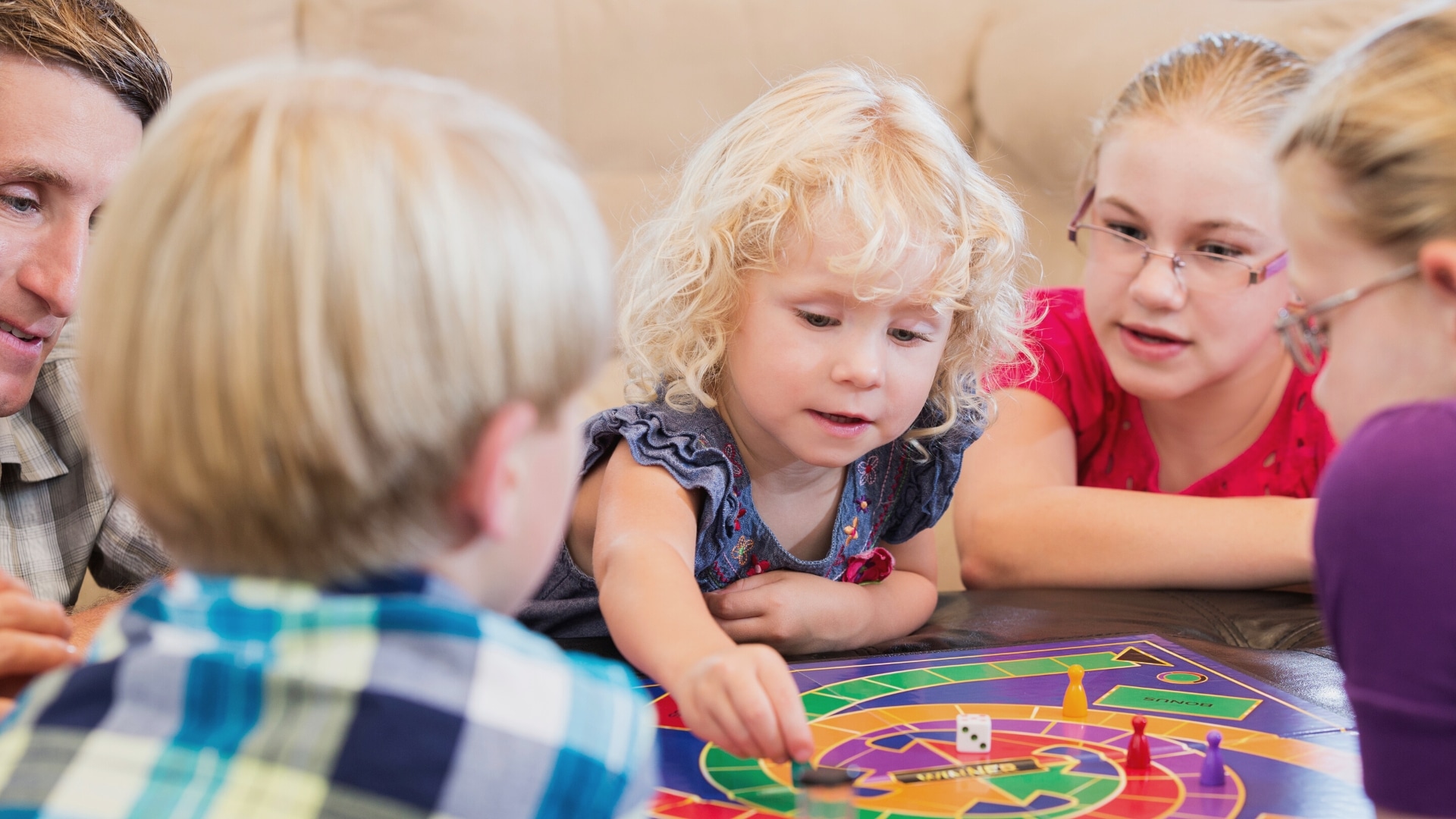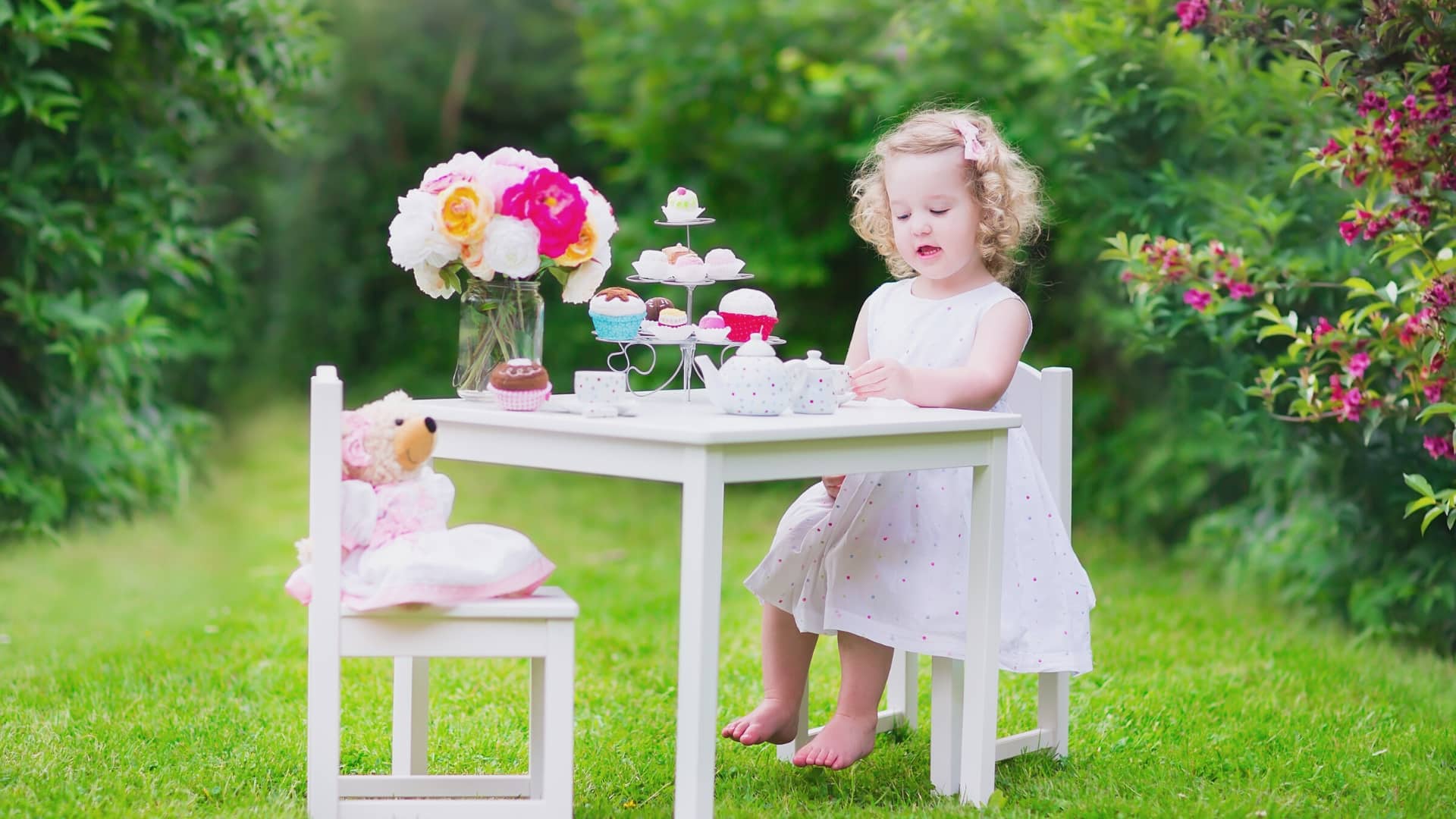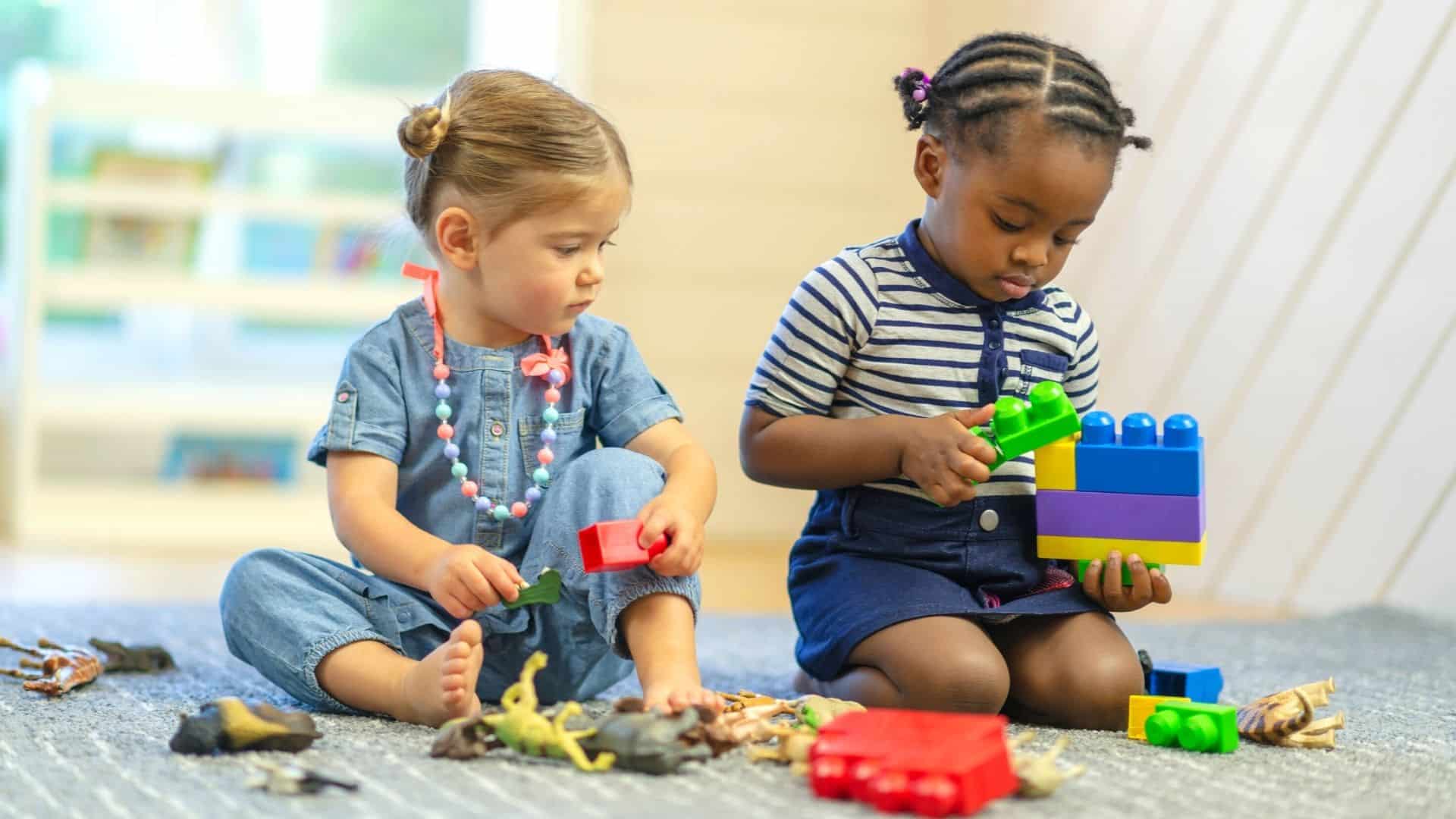Solitary play is the beginning of your little one’s ability to play, engage, imagine and develop a sense of self. And by encouraging your baby to play independently you are opening up their minds to the wonders of self-focused play and self-regulation.
What Is Solitary Play?
Solitary play is one of the 6 stages of play where an infant starts to play independently, completely uninterested and unaware of other children around them. During the solitary play stage, your child will have separate toys and they will not interact with other children.
What Are The Characteristics Of Solitary Play?
Solitary play is identified by the following 3 characteristics:
- Playing alone without seeking help or guidance
- Exploration of objects and toys alone
- Not playing interactively with others
What Is The Difference Between Solitary And Parallel Play?
This is a common question that parents often ask and the truth is…
The main difference between solitary play and parallel play is that in solitary play the child does not pay any attention to what others around them are doing.
Simple as that!
Parallel play is when a young child plays alongside others BUT is aware that others are there… however they are not ready to play with them in a cooperative fashion yet.
Looking to get your little one to sleep quickly and effortlessly without any bedtime battles? Check out my Bedtime and Nap Cheat Sheet and master the art of making daytime naps and bedtimes as seamless as possible.
A bedtime & nap cheat sheet so good your little one will ask you to put them to bed...
Laura Williams "This is a life saver! I'm so glad I downloaded your bedtime & nap cheat sheet. My little one actually asked me to put him to bed last night! Unbelievable! Thank you so much!"
Click Here For The FREE Cheat Sheet
What Age Do Babies Engage In Solitary Play?
Solitary play is common between the ages of 1 and 3. However, you may see your baby engaging in independent play even earlier than this because as soon as a baby is able to reach out and pat or grab a toy they are capable of solitary play.
It is also common in young toddlers because of their limited social, cognitive, and physical skills.
What Stage of Play Is Solitary Play?
Solitary play is one of the earliest stages of play. In fact, it’s the second of Mildred Parten’s six stages of play that your baby will progress through as they grow.
If you’re interested in the 6 stages of play, check out the below posts to learn more:
- Unoccupied Play (0-3 months)
- Solitary Play (most common in children under 3 years)
- Onlooker Play (most common in children aged 2-3 years)
- Parallel Play (most common in children aged 2.5-4 years)
- Associative Play (most common in children aged 3-4 years)
- Cooperative Play (also known as social play) (most common in children aged 4.5-6+ years)
Benefits Of Solitary Play
There are a huge number of benefits for your little one to engage in solitary play.
Here is a quick list of the main benefits of solitary play:
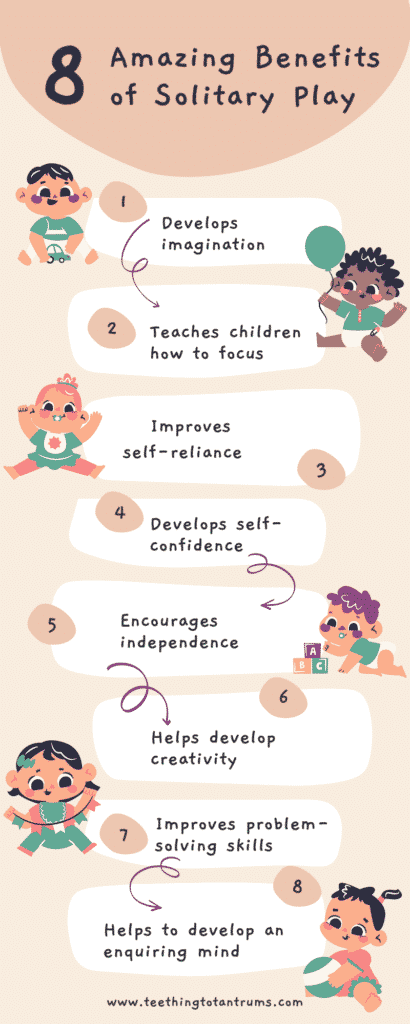
- Develops imagination.
- Teaches children how to focus.
- Improves self-reliance.
- Develops self-confidence.
- Encourages independence.
- Helps develop creativity.
- Improves problem-solving skills.
- Helps to develop an inquiring mind.
It has also been proven that children who engage in solitary play are more able to focus and have longer attention spans, which will undoubtedly make them better learners as they grow.
REMEMBER: From developing social independence, building self-confidence and encouraging a flourishing imagination, there is much that your child can gain from playing independently.
How Does Solitary Play Help With Emotional Development?
As well as the above benefits to your child learning to play independently, solitary play activities provide vital opportunities to develop and regulate your child’s emotional state.
Overstimulated toddlers can very easily end up in a state of meltdown…
So being able to play independently and alone, allows your little one to have time to regulate their emotions and re-centre themselves.
Introducing quiet times into your child’s daily routine where they are encouraged and allowed to play independently, allows them some downtime where they can relax and just be in the moment.
And we all need that from time to time!
NOTE: If you have the time and really want to delve into the connections between play and healthy development, this clinical report from the American Academy of Pediatrics is a fantastic read. – The Power of Play: A Pediatric Role in Enhancing Development in Young Children
How Can Parents Encourage Solitary Play
Obviously, young children should never be left unattended for long periods of time and you should always be keeping an eye on your little one…
But you can encourage your child to engage in solitary play by offering them opportunities to do so from an early age!
1. Let Them Take The Lead
Leaving your baby to play in their play gym as soon as they are able to swipe or grab at the toys, is a great way to start.
Later on, make sure you have times in the day when you allow your baby or toddler to just explore the world around them whilst you keep a watchful eye on them. (A box of silicone kitchen utensils or open-ended toys is always a winner!)
REMEMBER: Don’t always feel the need to offer them options or show them what to do. When your young child is playing, you don’t always have to play with them! You can simply be present in the room with them.
2. Provide Opportunities For Solitary Activities
With babies, you can put certain toys in their reach and watch what they do with them. Allow them to explore what they and the objects can do.
Stacking and nesting toys are great for solitary play and this eco-friendly stacking set ticks all the right boxes. I love the subtle colours and the shape of the nesting cups are super easy for little hands to hold.
I also love choosing wooden toys for children and this set from Melissa and Doug has all the basic essentials to keep your little one engaged for endless play sessions.
3. Encourage Your Child To Do Things For Themselves
Finally, encourage your child to do things for themselves as soon as they are physically able.
This will not only help with their ability to play independently but it will help to develop other areas such as fine motor skills and cognitive skills too.
REMEMBER: If your toddler is struggling to play alone you can always offer guidance and encouragement from the sidelines rather than doing things for them.
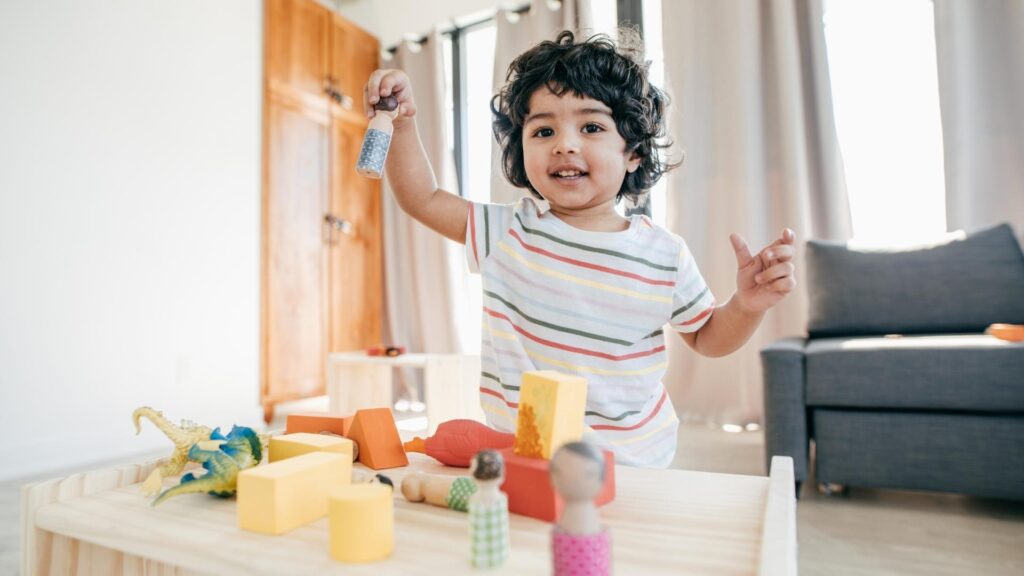
15 Examples Of Solitary Play Games
In infants, some examples of solitary play include:
- Interacting with a play gym
- Looking at board books with bright pictures
- Playing with building blocks
- Playing with nesting cups
- Playing with activity cubes
- Playing with shaking toys and rattles
In toddlers and preschoolers, great social play examples include:
- Completing a puzzle alone
- Colouring, chalk drawing or painting
- Playing in a sandpit
- Imaginative play such as talking to and dressing dolls or playing with pretend cleaning tools.
- Playing with wooden blocks
- Putting together lego
- Looking at books alone
- Playing with toy garages, cars and trains
- Talking and playing with stuffed animals and dolls
3 Common Concerns About Solitary Play
Understanding what level of play your child is emotionally and developmentally ready for is very important in your assessment of how your child is doing socially.
Common concerns about a child who engages in a lot of solitary play can include:
- Fear that your child is lacking in social skills.
- Worry that your child is overly shy.
- Concerned that your child is not developing normally.
While parents are usually very happy when their little one is able to amuse themselves and give them a bit of a break… parents may become anxious when their child prefers to play alone and not with others.
If this is the case, then slowly start by letting your little one observe the room when they are around other children or set up a playdate with one child on their home turf where they feel more confident.
If your child is not a social butterfly that is perfectly OK… they will eventually strike up a friendship with one or two children that they feel comfortable with.
Always remember that some children are naturally happier to engage in solitary play (much like some adults!) as they are naturally shy and may struggle to socialise with other children, particularly in a larger group.
In truth, a lot will come down to the personality of the child.
TOP TIP: If you are overly concerned with your child preferring to engage in independent play as they grow up, then you can have a discussion with your paediatrician who may suggest some counselling if they feel there is a need.
Need More Parenting Help?
- Download our FREE Bedtime & Nap Sleep Cheat Sheet. It’s a free, easy-to-use and proven formula designed for parents of 0-5 year olds to master the art of consistently undisturbed and restful sleep without the yelling, nagging or exhausting long-winded evenings.
- Check out our Parenting Toolbox. You’ll get access to expertly-chosen products that you can guarantee are the best for your little one and your wallet.
- Are you looking for personalized guidance to navigate the challenges of parenting? I offer 1-on-1 consultations to bring you tailored strategies and actionable advice to help support your child's growth and well-being with confidence.

A bedtime & nap cheat sheet so good your little one will ask you to put them to bed...
Laura Williams "This is a life saver! I'm so glad I downloaded your bedtime & nap cheat sheet. My little one actually asked me to put him to bed last night! Unbelievable! Thank you so much!"
Click Here For The FREE Cheat Sheet


